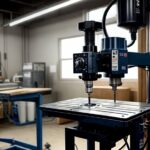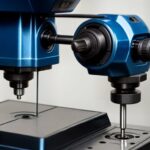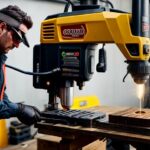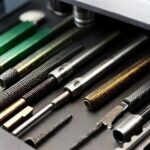Drill presses are a must-have piece of equipment for anybody who has to drill holes precisely and correctly. Yet, with so many kinds of bits available, choosing which ones to utilize may be tricky. This article will examine unique bits and their use in drill presses.
We’ll discuss what makes a bit “special,” why drill presses may need special bits and the benefits of utilizing them. Lastly, we’ll go through how to choose the best special bits for your drill press. Thus, whether you’re a seasoned expert or a do-it-yourself enthusiast, keep reading to learn all you need to know about special drill press bits.
What are special bits?
Special bits are drill bits that are particularly developed to address unique drilling demands that ordinary bits cannot achieve. These bits may be constructed of various materials, have distinctive forms or characteristics, or be tailored for drilling certain kinds of materials or under specific circumstances.
They may also have specific coatings or surface treatments to improve durability or minimize friction during drilling. Special bits are often used in high-precision drilling activities, such as manufacturing, metallurgy, or woodworking, where accuracy and consistency are critical.
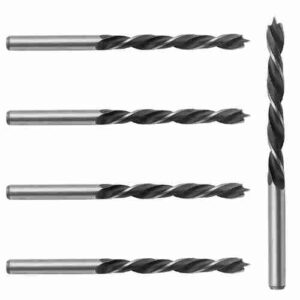 Types of special bits:
Types of special bits:
- Brad point bits: These are intended for drilling wood, having a sharp point that keeps the bit from straying or sliding on the wood’s surface.
- Forstner bits: These are intended for drilling holes with flat bottoms in wood, with a circular rim creating a neat, flat hole.
- Countersink bits: These are intended to drill and countersink a hole in a single step, leaving a cone-shaped depression surrounding the hole to allow a screw head.
- Step bits: These are intended to drill holes of various sizes in metal or plastic, with stepped diameters enabling the operator to drill progressively bigger holes.
- Auger bits: These bits are intended for drilling deep, straight holes in wood and have a long, spiraling shaft that drags the bit into the wood as it drills.
- Masonry bits: These are intended for drilling into concrete, brick, or stone and include a carbide or diamond tip that can resist the material’s hardness.
- Cobalt bits: These are intended for drilling into hard metals and include a high-speed steel structure with a cobalt alloy that boosts heat resistance and endurance.
- Titanium bits: These are intended for drilling through various materials and include a titanium coating that lowers friction and increases bit life.
- Do drill presses need special bits?
Choosing the correct kind of bit for the task is essential to guarantee precision, efficiency, and safety throughout the drilling process. The usage of customized bits in drill presses is dependent on the individual drilling needs and materials employed. In certain circumstances, normal bits may suffice; in others, special bits may be required to get the best outcomes.
Why drill presses may need special bits?
Drill presses may need the use of specific bits for some reasons, including:
- Precision drilling needs: Customized bits are often needed for applications requiring high precision and accuracy, such as manufacturing or woodworking. These bits may be designed to drill to certain depths or to make exact diameter holes.
- Material-specific drilling requirements: Various materials need different kinds of bits. Masonry bits, for example, are built for drilling into concrete, while wood bits are meant for drilling through wood. Using the incorrect bit for a given material may cause harm to both the bit and the material being drilled.
- Unusual drilling scenarios: Certain drilling conditions, such as drilling at an angle or into a curved surface, need specialized bits. To address these particular scenarios and deliver best drilling outcomes, special bits may be produced.
- Improved safety features: Special bits may also be built with safety characteristics in mind, such as decreased kickback or enhanced drilling stability. This is especially crucial for high-risk drilling applications or individuals unfamiliar with drill presses.
Advantages:
- Increased accuracy and consistency: Special bits are often built with precision in mind, resulting in higher drilling accuracy and consistency. This is especially useful in applications requiring great accuracies, such as manufacturing or carpentry.
- Improved bit durability and longevity: Special bits often comprise high-quality materials with increased durability and a longer lifespan. This means they can survive the rigors of repeated usage and are less prone to break or get damaged during drilling.
- Improved safety features: Several special bits are developed with safety characteristics in mind, such as decreased kickback or better drilling stability. This is especially crucial for high-risk drilling applications or individuals unfamiliar with drill presses.
- Drilling certain materials: Customized bits are often intended to drill specific materials, such as masonry or metal. Choosing the correct bit for the material being drilled may provide best results and avoid material or bit damage.
- Increased adaptability: Special bits are available in various shapes and sizes, providing more diversity in drilling applications. This enables users to drill holes of various sizes and forms and meet unusual drilling scenarios.
How do you choose the best special bits for your drill press?
- Determine drilling requirements: The first step in selecting the proper special bits for your drill press is to determine your requirements. Consider the materials you’ll be drilling with, the holes you’ll need to make, and any unusual drilling conditions you could encounter.
- Take into account bit material and design: Various special bits are created from different materials and have distinct designs, each with its advantages and disadvantages. Cobalt bits, for example, are built for drilling hard metals, but carbide-tipped bits are better suited for drilling into masonry or concrete. Evaluate the material you will be drilling and choose a bit suitable for that substance.
- Get advice from experts or product manuals: If you need clarification on which unique bits to use for your drilling requirements, seek advice from experts or product manuals. These sites might provide important advice and suggestions on which pieces best suit your needs.
- Invest in high-quality bits: Investing in high-quality, unique bits specifically built for your drilling requirements is critical. Lower-quality bits may require more precision, durability, and safety features for excellent drilling outcomes.
Frequently Asked Questions (FAQs)
1. Can I use regular bits in a drill press?
Yes, you can use regular bits in a drill press for general drilling applications. However, for specific materials, precision drilling, or unique drilling scenarios, you may need to use special bits designed for those purposes.
2. How do I know if I need a special bit for my drill press?
Consider the materials you will be drilling, the level of precision required, and any unusual drilling conditions. If your project involves drilling into specific materials, requires high accuracy, or has unique drilling scenarios, you may need to use special bits.
3. Can I use a special bit in a handheld drill instead of a drill press?
Some special bits can be used in handheld drills, but they may not provide the same level of precision and stability as when used in a drill press. Always check the manufacturer’s recommendations for the appropriate use of special bits.
4. How do I maintain and care for my special bits?
To maintain and care for your special bits, clean them after each use to remove any debris or buildup. Store them in a dry, cool place, and avoid exposing them to extreme temperatures or humidity. Periodically inspect your bits for any signs of wear or damage, and replace them as needed.
5. Where can I purchase special bits for my drill press?
Special bits for drill presses can be purchased at hardware stores, online retailers, or through specialty tool suppliers. When purchasing special bits, ensure that they are compatible with your drill press model and designed for the specific materials and tasks you will be performing.
Final words:
You can only get good results from your drill press if you use the appropriate bits. Precision drilling, drilling into specialized materials, unusual drilling scenarios, and increased safety requirements are just a few reasons specialty bits are typically required in addition to regular bits.
Drilling using specialized bits has several benefits, such as higher precision and consistency, longer bit life, greater safety, the capacity to drill certain materials, and a more comprehensive range of possible uses.
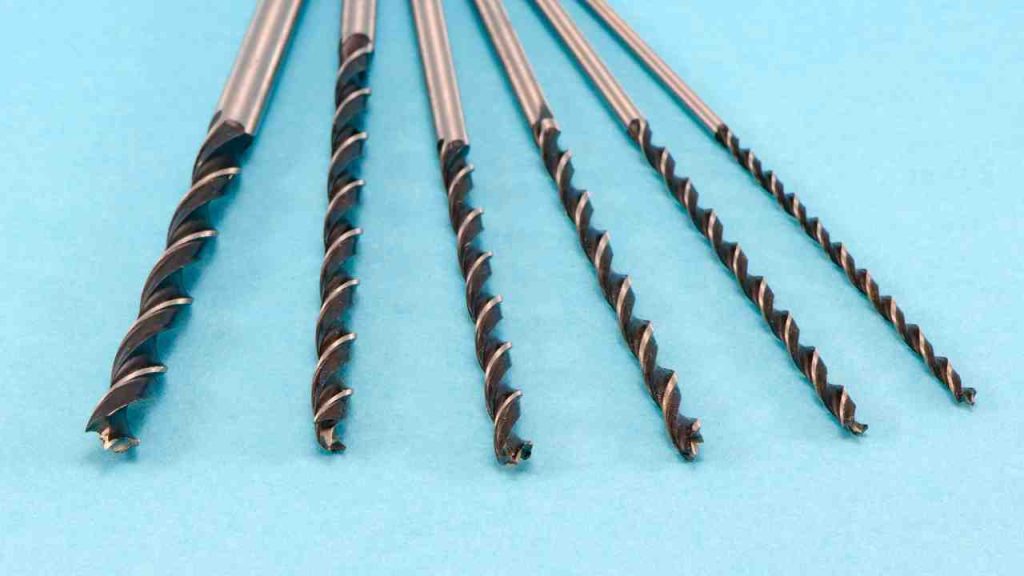
Think about what you’ll be drilling, the bit’s material and design, any guidance from an expert, and how much you’re willing to pay in high-quality bits when deciding the best special bits for your drill press. Whether you are a seasoned expert or a do-it-yourself enthusiast, using the proper special bits can help you drill with improved precision, efficiency, and safety.
- Where are WEN drill presses made? - April 2, 2023
- Where are Rikon drill presses made? - April 1, 2023
- Where are Powermatic drill presses made? - April 1, 2023


